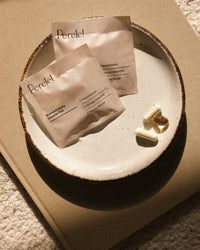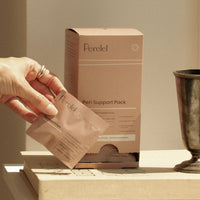It may seem like essential oils are suddenly having their moment in the sun but the truth is these therapeutic powerhouses have been touted for their benefits for thousands of years. Ancient Egyptians used aromatic oils as early as 4,500 B.C. in cosmetics and ointments1. You don’t need to bother with the math to know that’s a really long time ago.
If you’ve found yourself Googling the efficacy and safety of essential oils during pregnancy, (Because what don’t we Google while with child?!) read on for the wisdom Catalina Clark, Licensed Midwife, Certified Professional Midwife, and advocate for holistic living, including nutrition, herbs, homeopathic remedies and essential oils. Clark filled us in on the safety of essential oils during pregnancy, what to use and what to avoid.
Are Essential Oils Safe to Use During Pregnancy?
Yes, the most important thing to remember when using oils any time is quality. You want to make sure that you are using brands that guarantee to provide one-hundred percent pure, therapeutic-grade oils produced from carefully identified plants with natural chemical profiles that match or exceed the recognized standard for essential oils. You also want to source oils from companies that have transparent comprehensive and rigorous internal standards. This is an essential component in gaining therapeutic results without producing harmful side effects.
Can they be used in all trimesters?
Yes they may. Sensitivity levels may vary at different stages in pregnancy so it is important to always test your oils first and listen to your body. Citrus oils should be avoided topically before any sun exposure. Potentially photosensitive oils include ginger, and citrus oils such as lemon, lime, tangerine, bergamot and orange.
How should essential oils be used during pregnancy?
- You can inhale essential oils directly from the bottle holding them down by your waist and slowly raise the bottle up to your chest taking slow deep breaths. Do not lift the bottle higher than chin level or snort oils directly to avoid direct contact with the nose.
- Topically with a carrier oil such as fractionated coconut oil, or any other nut oil. Always do a skin patch test on the forearm first to see if you're sensitive to an oil or not.
- A cold air diffuser is considered to be the most effective way to disperse the hundreds of essential oil molecules into the air. Heat may change the chemical structure of the oil's molecules, making their healing and therapeutic qualities more ineffective. Depending on the size of your diffuser you can pour four to 10 drops of oil into the diffuser well and let it run for approximately 15 minutes twice a day per room.
- Homemade ointments, lotions, salves and belly balms.
- Food preparation—think lavender lemonade, peppermint brownies and such.
- Non-toxic household cleaning with essential oils such as thieves and lemon with baking soda can replace commercial products that contain harmful ingredients to pregnant people.
How can you use essential oils to treat pregnancy-related symptoms?
- Headaches may be relieved with lavender, peppermint and roman chamomile.
- Morning sickness and nausea? Try digize, sandalwood and peppermint.
- Heartburn and indigestion can be treated with lemon, copaiba, and peppermint.
- Emotional support may be found when using frankincense, valor, bergamot, rose and Idaho balsam fir.
- Allergies bothering you? Try lavender and eucalyptus.
- Back pain relief may be found with valor.
- Breech baby? Look towards peppermint or myrrh.
- Labor essential oils are jasmine, ylang ylang, geranium, lavender, frankincense or roman chamomile.
- Lactation support. To increase your supply try fennel. To decrease your supply consider peppermint.
Which Essential Oils Should You Avoid During Pregnancy?
- Clary Sage
- Basil
- Birch
- Calamus
- Cassia
- Cinnamon Bark
- Hyssop
- Idaho Tansy
- Lavadin (a form of lavender often sold in stores)
- Rosemary
- Sage
- Tarragon
- Wintergreen
We want to hear how your pregnancy experience is going. Join our community, Village by Perelel, to share.
This article is for informational purposes only. It is not, nor is it intended to be, a substitute for professional medical advice, diagnosis, or treatment and we recommend that you always consult with your healthcare provider. To the extent that this article features the advice of physicians or medical practitioners, the views expressed are the views of the cited expert and do not necessarily represent the views of Perelel.
Written by Jessica Lopez. Jessica Lopez is a freelance writer, digital content creator, and new mother. She has covered all lifestyle topics ranging from bridal to beauty for publications including Brides Magazine, Byrdie, THE/THIRTY, and more. Walking wide-eyed into motherhood has inspired her to connect with other parents through her writing and shared experience. You can follow more of her journey @Jessica.H.Lopez.





















